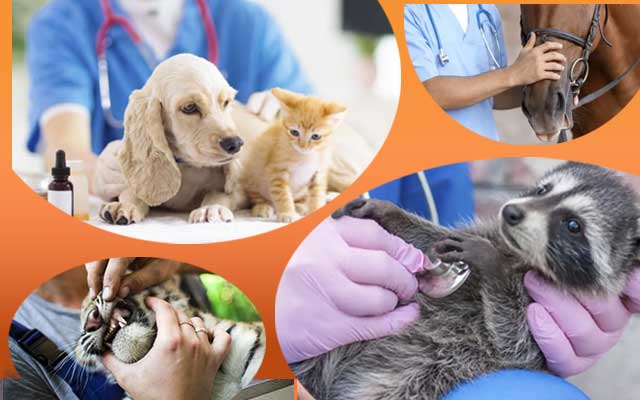Veterinary Medicine is medicine for animals. Like human medicine, it is divided into different categories of veterinary services.
Veterinary medicine covers disease prevention, control, diagnosis, treatment, and aftercare.
Understanding Veterinary Medicine Options
Broadly, veterinary medicine focuses on the health of both domestic and wild animals. Many veterinary services begin before animals get sick since preventing disease is often easier than curing it.
So, remember to schedule your pet for an annual check-up. Once your pet shows symptoms of unusual behavior, contact us as soon as possible.
Veterinary medicine includes numerous specialties. Let’s dive deeper under this big umbrella to better understand each specialty.
Conventional Veterinary Medicine Options
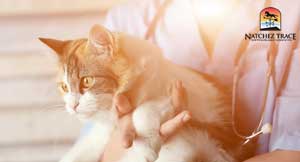 Conventional veterinary medicine includes traditional veterinary services used to evaluate all animal diseases, treatments, and the like. This method provides solutions in the form of pharmaceutical drugs or surgery.
Conventional veterinary medicine includes traditional veterinary services used to evaluate all animal diseases, treatments, and the like. This method provides solutions in the form of pharmaceutical drugs or surgery.
In essence, conventional medicine is allopathic. It targets the specific body sections or organs affected by illness.
Conventional veterinarians check an animal on the surface level. This practice is a life-saving approach when fighting infectious ailments and straightforward diseases.
Here are the conventional services Natchez Trace Veterinary Services (NTVS) offers:
Dentistry
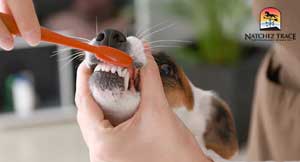 Animals are resourceful when it comes to using their mouth.
Animals are resourceful when it comes to using their mouth.
Your pets use their teeth for scratching itchy flesh, gnawing on their toys, and chewing food. Pets use their tongues to clean themselves and lap up water.
Veterinary services include dentistry to help keep your pet’s mouth in clean and healthy order. It is natural for tartar to accumulate, which may lead to infections. Give your pet a healthier lifestyle with a yearly dental check-up.
NTVS offers professional dental cleaning, including a complete physical exam, teeth scaling, polishing, and antiseptic flushing.
Stay informed about your dog’s dental health by watching this playlist curated for you:
Radiology and Ultrasound
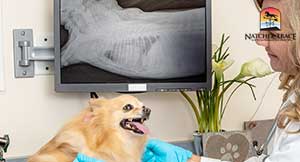 Animals are notorious for getting anything inside their body, so imaging is often necessary.
Animals are notorious for getting anything inside their body, so imaging is often necessary.
On one hand, radiology specializes in diagnostic imaging that uses radiation. X-rays are typically used to assess issues related to bones, foreign items moving in the digestive tract, and blood clots. To put it simply, x-rays are often used to view the harder parts of the body.
Ultrasound, on the other hand, uses sound waves to generate a picture. This is useful when it comes to examining the softer tissues and organs of an animal, including the heart, liver, kidney, stomach, intestines, bladder, and the like.
Because the procedure is safe and non-invasive, it is also used to guide biopsy needles toward their target, collect fluids, and monitor pregnancy.
Veterinary radiology and ultrasound are crucial for pinpoint inspections, thorough diagnosis, and accurate treatment plans. Depending on the level of complexity, general veterinary practitioners usually do both of these.
In complicated cases, veterinary clinics often work with specialists who perform these services.
Both of these procedures are very safe. Some pets may require sedation depending on which part of the body is checked. After all, animals are like babies- they are not very good at staying still.
If you are not sure whether your pet needs a radiology or ultrasound service, we can help you make the best choice.
Endoscopy
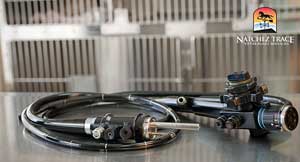 Sometimes, diseases may require a live and moving view of how your pet’s internal system works. Endoscopy is the answer to this.
Sometimes, diseases may require a live and moving view of how your pet’s internal system works. Endoscopy is the answer to this.
Safe, fast, and straightforward, the process inserts a thin and very flexible tube with a camera attached on the end, down an animal’s throat, straight into the esophagus, stomach, and digestive tract.
Your pet must stay still during the entire evaluation, so anesthesia is mandatory. To avoid complications, animals must fast approximately 24 hours before the procedure.
Surgery
 Surgeries are a familiar solution in the medical world. Some surgeries are more invasive than others. You must be ready to commit to pre-surgery and post-surgery care to keep your pet safe and secure.
Surgeries are a familiar solution in the medical world. Some surgeries are more invasive than others. You must be ready to commit to pre-surgery and post-surgery care to keep your pet safe and secure.
Just like in human medicine, veterinary surgical services vary from simple operations to intensely complicated ones. Hence, you must make the best decision when it comes to selecting where and who gets to work on your beloved pets.
NTVS offers veterinary surgical services. Our goal is to offer the safest, most efficient, practical, and pain-free surgery available.
Laboratory Blood Work
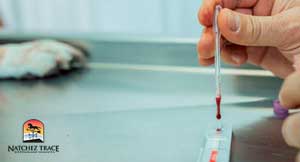 A drop of blood can tell us many things your pets will not be able to convey.
A drop of blood can tell us many things your pets will not be able to convey.
Laboratory bloodwork is the easiest way to check whether an animal is suffering from certain diseases. It provides information related to red and white blood cells, platelets, and vital organs.
From routine bloodwork to specialized bloodwork, veterinary laboratory blood testing services allow for monitoring and assessing general health. Check with us to see what bloodwork we recommend for your specific case.
Geriatric Medicine
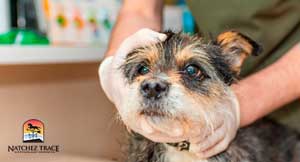 Geriatric medicine is medicine for older animals. Age can greatly affect an animal’s daily capabilities. Your pets will require special treatment as they age.
Geriatric medicine is medicine for older animals. Age can greatly affect an animal’s daily capabilities. Your pets will require special treatment as they age.
For example, pharmaceutical drugs that will work on a two-year-old feline may stop working when she reaches the age of 10. Dosage will also differ. Surgery procedures also become riskier as the years continue.
Keep in mind that animals will require more care with age. Regular check-ups and a healthy regimen will go a long way for them.
Eastern Medicine or Traditional Chinese Veterinary Medicine Options
 Some animals do not respond well to conventional veterinary services.
Some animals do not respond well to conventional veterinary services.
Eastern medicine or traditional Chinese veterinary medicine (TCVM) is a treatment that focuses on the entire being rather than a specific part of the whole. It dives into the root of the problem, healing the body from all possible angles.
Holistic veterinarians who use this method believe in the connection of the mind, body, spirit, and energy. If your pet suffers from a skin disease, rest assured, a holistic vet will consider the food they eat, the activities they do, and the flow of their natural energy.
These are all parts of TCVM:
Food Therapy
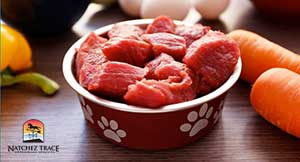 As an old saying goes, you are what you eat.
As an old saying goes, you are what you eat.
Food therapy relies on the long and continuous process of keeping your pet’s health in check by considering the natural cause and effect of each ingredient they eat.
Food therapy is an ancient practice that uses foods and herbs to control the functions of the body and counteract infections and other illnesses.
Veterinary food therapy is a simple, safe, and economical choice under the guidance of a trained and well-studied holistic vet.
The best part is, with the guidance of your vet, you can even prepare your pet’s food therapy at home!
Tui-Na
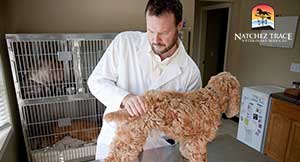 China has practiced the art of Tui-Na for thousands of years. It uses the hands to manipulate pressure points in the body, similar to massage and chiropractic therapy.
China has practiced the art of Tui-Na for thousands of years. It uses the hands to manipulate pressure points in the body, similar to massage and chiropractic therapy.
This hands-on method is perfect for dealing with musculoskeletal disorders and problems with internal organs.
The study of pressure points is a foreign concept in Western medicine but the physiological effects from simple body massages are relieving and comfortable.
As a whole, Tui-na is non-invasive, focuses on treating internal diseases, and requires a thorough diagnosis before proceeding with the treatment.
Tui-na works like magic in the hands of a certified practitioner.
Watch how Tui-Na massage relieves older or anxious dogs:
Eastern Herbals
 Eastern herbals use plants and herbs to prevent illnesses, cure diseases, and overall provide your pet with a healthy and balanced life. To understand, you must go back to the most basic connection between living beings and nature.
Eastern herbals use plants and herbs to prevent illnesses, cure diseases, and overall provide your pet with a healthy and balanced life. To understand, you must go back to the most basic connection between living beings and nature.
Varying diseases will require specific herbal treatments. After examining your pet’s tongue and pulse, we can choose the proper TCVM herbal formula(s) for your pet.
At their core, Eastern herbals work together with the environment rather than counteract it.
Acupuncture
 Acupuncture can be considered the invasive form of Tui-na. It uses small filiform needles injected at specific points on the body to redirect an animal’s energy.
Acupuncture can be considered the invasive form of Tui-na. It uses small filiform needles injected at specific points on the body to redirect an animal’s energy.
Veterinarians who practice Eastern medicine are familiar with the concept of meridian points and use them to restore the balance between the physical body and the energy that flows within. It may take several treatments before any kind of response is achieved.
Acupuncture is a safe medical treatment for animals but only in the hands of a properly trained veterinarian.
Watch this video of an elderly dog regaining movement after sessions of acupuncture:
Alternative Veterinary Medicine Options
 There is science behind the study of Western medicine and accumulated centuries of experience to back the claims of Eastern therapy. The integration of both paves paths for alternative veterinary services.
There is science behind the study of Western medicine and accumulated centuries of experience to back the claims of Eastern therapy. The integration of both paves paths for alternative veterinary services.
Alternative therapy combines Western and Eastern medicinal approaches or integrates principles from one or the other into an altogether new and different treatment. These alternatives give more room for veterinarians to work with the ever-growing number of diseases they come across.
The following are examples of alternative therapy offered at NTVS:
Check out this video of Alternative Vet Med for cancer treatment:
Chiropractic Treatments
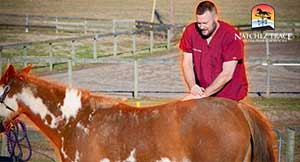 The brain commands the body what to do, and the nervous system uses the nerves to transmit the commands to all body parts through the spinal cord.
The brain commands the body what to do, and the nervous system uses the nerves to transmit the commands to all body parts through the spinal cord.
In short, the nervous system keeps the body alive and moving.
Chiropractic care borrows from the idea of massage and incorporates it with what we know about neuro-musculoskeletal conditions. Physical stress and trauma can lead to spinal fixations, stiffened muscles, and hardened ligaments.
Veterinary chiropractors manipulate the spinal cord to release blocked nerve pathways and restore optimal function and mobility.
Once the nerve paths are cleared, your pet’s internal systems can better communicate with each other. When this happens, your pet often experiences relief.
Biopuncture
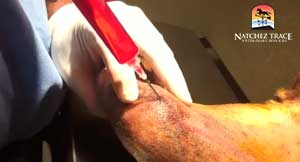 If your beloved pets come across foreign substances, the first line of defense is to strengthen their ability to fight toxic elements. If the defense is breached, then the immune system goes into overdrive to keep the body moving.
If your beloved pets come across foreign substances, the first line of defense is to strengthen their ability to fight toxic elements. If the defense is breached, then the immune system goes into overdrive to keep the body moving.
Now, your pet is sick, and you’re not sure how to maintain his natural ability to overcome infections. What will you do?
Nature often holds the cure to the world’s diseases, and that is true for biopuncture.
Biopuncture involves injecting naturally derived liquid into the affected area, assisting in the process of natural healing. These products come in low doses to help animals adjust to the substance while slowly healing them from the inside out.
Nothing is more relieving than returning good health to your animal companion.
Just make sure to ask us for advice in case your pet is allergic to specific natural products.
Prolotherapy
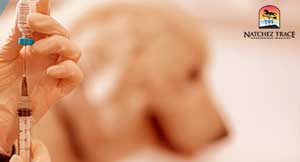 Injured, torn, or damaged joints and ligaments can happen to all kinds of animals. When this happens, solutions will vary depending on the intensity of the injury.
Injured, torn, or damaged joints and ligaments can happen to all kinds of animals. When this happens, solutions will vary depending on the intensity of the injury.
Animal prolotherapy aims to reconstruct ligaments without surgery. Prolotherapy involves injecting an irritant solution into the affected parts. This causes forced inflammation. Your pet’s natural reaction to the infection kickstarts the healing process, making way for new and healthy tissues to grow.
This treatment is not a substitute for surgery. A vet will have to thoroughly check your pet to decide whether the procedure will work on them or not.
Cancer Treatments
 Cancer is the bane of an animal’s existence. If only we, as pet parents, could stop it from happening, we would.
Cancer is the bane of an animal’s existence. If only we, as pet parents, could stop it from happening, we would.
Fortunately, veterinary medicine has many effective cancer treatments to ease pain, help with side effects, and prolong life. Though treatment options may differ according to the type of cancer, the most common ones are surgery, chemotherapy, and radiation. There are also many TCVM alternative cancer treatments.
Animal cancer can be difficult to notice, so make sure to familiarize yourself with its symptoms. It is better to be prepared than wait. Annual exams are a powerful tool in finding cancer early.
NTVS offers various animal cancer treatments. Physical examination and select routine lab tests may be mandatory.
Stem Cell Therapy
 Stem cells have the ability to turn into different types of cells or tissues that the body needs. This makes stem cells therapy a regenerative medicine where lost or destroyed internal body parts are replaced with new ones.
Stem cells have the ability to turn into different types of cells or tissues that the body needs. This makes stem cells therapy a regenerative medicine where lost or destroyed internal body parts are replaced with new ones.
If you’re wondering where vets get these cells, worry no more! Stem cells can be harvested from your pet’s fat reserves where the fats are processed, stem cells collected, and administered back into their body through the affected areas.
From there, the natural process of regeneration begins.
Feel free to ask your vet as many questions as you can about stem cell therapy.
Combining Western and Eastern Medicine
 Combining Western and Eastern medicine means you’ll get the best of both worlds!
Combining Western and Eastern medicine means you’ll get the best of both worlds!
Western medicine’s focus on symptoms works very well with Eastern medicine’s ability to trace disease to its root cause, something that cannot be tangibly seen. Treating symptoms with both methods gives you a 360-degree view of the problem.
Combining the two approaches can provide relief stronger than either one alone.
Based on our years of experience, using both types of medical approaches gives your pet a strong advantage and a higher chance at healing.
Conclusion
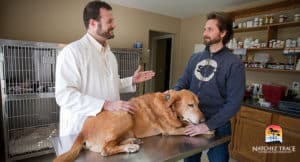 The sphere of veterinary services has grown wider over the years. This means we’re making progress in finding ways to heal as many animal diseases as we possibly can.
The sphere of veterinary services has grown wider over the years. This means we’re making progress in finding ways to heal as many animal diseases as we possibly can.
The numerous and varied selections are a comfort to both vets and pet parents.
While conventional medicine has its advantages, this practice also tends to miss out on the root cause of an issue. Hence, Eastern and alternative medicine come into play.
Want to know more about the many ways you can take care of your pets? Be sure to download these free e-books written by Dr. Smith.

